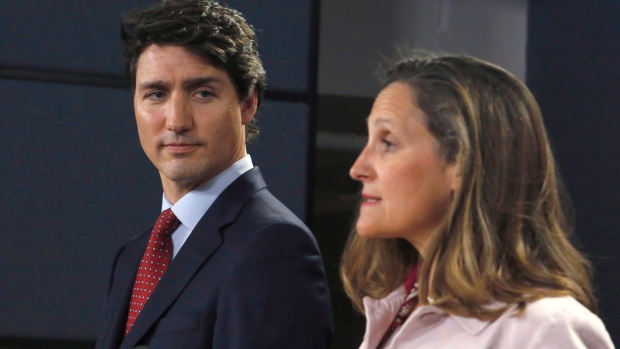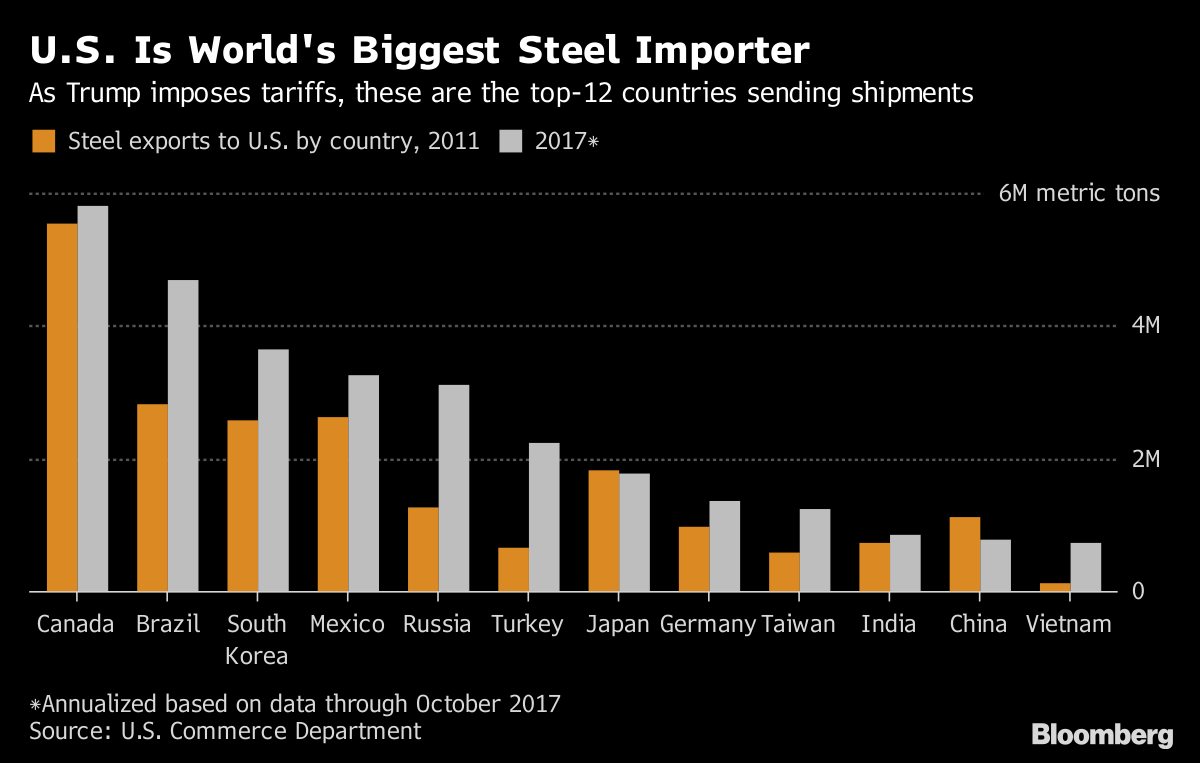May 31, 2018
Canada hits back at U.S. tariffs with up to $16.6B in surtaxes
Bloomberg News

Canadian Prime Minister Justin Trudeau retaliated swiftly against metal tariffs announced by President Donald Trump, imposing levies on as much as $16.6 billion of U.S. imports in what Canada calls its strongest trade action since the Second World War.
Trudeau invoked decades of battles fought alongside the U.S. and defending North American airspace as proof that the U.S. tariffs based on a national security investigation are “unacceptable” and “punitive.” The Canadian tariffs will be 25 per cent on steel and 10 per cent on aluminum, and aim to match U.S. penalties on a dollar-for-dollar basis based on export values, according to Foreign Affairs Minister Chrystia Freeland.
“We have to believe that at some point their common sense will prevail,” Trudeau told reporters in Ottawa Thursday. “But we see no sign of that in this action today by the U.S. administration.”
The tariffs take effect on July 1 and will last until the U.S. ends its move. The measures will cover goods beyond aluminum and steel. Canada will also launch challenges of the U.S. tariffs at the World Trade Organization and through a NAFTA panel.
The U.S. decision came hours before temporary exemptions were due to elapse at 12:01 a.m. in Washington on Friday. The move marks the Trump administration’s most aggressive trade action yet against major U.S. trading partners, which had been fighting for permanent relief.
“This is the strongest trade action Canada has taken in the post-war era,” Freeland said.
Trudeau said the Trump move will hurt U.S. interests.
“The American administration has made a decision today that we deplore,” Trudeau said.“They don’t quite understand this is going to harm Americans” as well, he said.
The Prime Minister outlined Canada's position in a series of tweets, reiterating that "Americans remain our partners, friends and allies."
The EU said it would take immediate steps to retaliate, while Mexico vowed to impose duties on everything from U.S. flat steel to cheese. Canada was expected to respond later Thursday, but said earlier this week it would react “appropriately” to any tariffs.
“This is a bad day for world trade,” European Commission President Jean-Claude Juncker said in Brussels after the announcement. “It’s totally unacceptable that a country is imposing unilateral measures when it comes to world trade.”
The EU said on Thursday it will impose retaliatory duties, a measure the bloc earlier indicated would target US$3.3 billion in American products from Harley-Davidson Inc. motorcycles to Levi Strauss & Co.’s jeans as well as bourbon whiskey. The bloc also plans to proceed with a case at the World Trade Organization against the U.S. import restrictions.
- Trudeau says he abandoned visit to D.C. over Trump's NAFTA sunset clause insistence
- Canada has to ‘fight fire with fire’: Reaction to Trump’s metals tariffs
- By the numbers: A look at Canada's steel, aluminum industries as tariffs loom
TARIFF TACTICS
The tariffs come as G7 finance ministers including U.S. Treasury Secretary Steven Mnuchin and central bank governors prepare to meet in Whistler, Canada. Growing trade tensions have clouded a benign outlook for the global economy, which is on track to grow at its fastest pace in seven years this year and next, according to the International Monetary Fund
U.S. Commerce Secretary Wilbur Ross said there wasn’t enough progress in discussions with the EU over trade concessions and Canada and Mexico on rewriting the North American Free Trade Agreement to give them permanent exemptions from the metals tariffs.
“We continue to be quite willing and eager to have further discussions with all of those parties,” Ross told reporters on a conference call on Thursday. “We are awaiting their reaction.”
Stocks in the U.S. fell as the administration ignored the pleas from business lobbying groups including the U.S. Chamber of Commerce to forgo tariffs.
The shares of American steel producers, which have supported the tariffs, rose across the board on Thursday. Nucor Corp., the biggest U.S. steel producer, rose 0.6 per cent to US$64.49. U.S. Steel Corp., AK Steel Holding Corp. and Steel Dynamics Inc. all gained in New York.
Ross said he’s looking forward to “continued negotiations" with Canada, Mexico and the EU “because there are other issues” that need to be resolved. There’s potential “flexibility” in the future because the president has the power to increase or cut tariffs, remove them, or enact quotas, he said.
Trade War
Fears of a global trade war are mounting as the Trump administration also considers tariffs on U.S. auto imports and duties on US$50 billion in Chinese goods.
The steel and aluminum levies and auto-import probe could play well with Trump voters in Rust Belt states in the lead-up to congressional midterms in November. But the tariffs aren’t popular among pro-trade lawmakers in Trump’s own Republican Party.
“Tariffs on steel and aluminum imports are a tax hike on Americans and will have damaging consequences for consumers, manufacturers and workers,” said Senator Orrin Hatch of Utah, chairman of the Finance Committee, which oversees trade in the upper chamber. “We should build on our success in overhauling the nation’s tax code with complementary trade policies that, rather than favoring one narrow industry, make all sectors of the U.S. economy more competitive.”
In imposing the tariffs, President Donald Trump invoked a seldom-used section of a 1960s trade law that allows him to erect trade barriers when imports imperil national security. Trump in March imposed 25 per cent duties on imported steel and 10 per cent on aluminum, but he gave temporary reprieve to a handful of allies for further talks to take place.
The White House said in a statement Thursday that those tariffs have already had “major, positive effects” on steel and aluminum workers.
NAFTA Negotiations
The EU said from the outset it wouldn’t make trade concessions to the Trump administration to gain a permanent exemption. Canada and Mexico also rejected the White House’s suggestion of linking tariff relief to the outcome of ongoing talks to revamp NAFTA.
Trump imposed the tariffs in March after the Commerce Department declared that steel and aluminum imports undermine the country’s manufacturing base and threaten national security. The action was mainly targeted at China over accusations of flooding the global market with cut-rate metals and dragging down prices. The Trump administration has said a global tariff is necessary because China is shipping its steel through other nations.
The White House is also employing national security as a justification to investigate auto imports. The probe was seen as an attempt to pressure Mexico and Canada over a NAFTA deal, considering they are the two-biggest suppliers of foreign vehicles to the U.S.
NAFTA negotiations are “taking longer than we had hoped. There is no longer a very precise date when they will be concluded,” Ross said on Thursday.
With files from BNN Bloomberg





